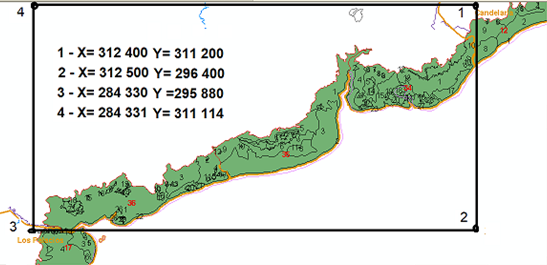Methodology for the monitoring of the mangrove recovery in the mouth of the San Cristobal river
Main Article Content
Abstract
The present work consisted of designing a methodology that allows the continues of recovery of the mangrove ecosystem, in the face of the new scenarios of climate change, with a geographic information system for monitoring and updating, from the mouth of the San Cristóbal River to the Los Colorados River, due to the deterioration of a strip of the mangrove ecosystem in the south zone of San Cristóbal municipality, Artemisa province. The area under study covered 1582.59 hectares of mangrove forest south of the municipality of San Cristóbal, which was subjected to massive mortality due to anoxia after the passage of hurricanes. The study was developed in three fundamental moments of the work: Biophysical diagnosis of the ecosystem; analysis of risk-vulnerability and adaptation with a view to the recovery of the ecosystem with integrated management; and application of the methodology from its adaptation and adecuation, to the coastal sector, seriously affected, both by natural and anthropic factors. Action plans and development strategies were defined and some advanced techniques that make up the field of Applied Geomatics were combined, obtaining different thematic layers of the mangrove forest vegetation, used in the risk analysis management process with integrated management in Coast zones.
Downloads
Article Details
References
Baigorría, D., Rodríguez, G. Nueva experiencia en la restauración de manglares. Revista Forestal Baracoa (CU) 27 (2): 2 – 12. 2008
Rodríguez, G. et al. Enfoque de manejo de riesgo climático para la reducción de desastres y adaptación al cambio climático en zonas costeras. Revista Forestal Baracoa (CU) 30 (12): 45 – 51. 2011
Decreto Ley 212 Gestión de Zonas Costeras. Gaceta Oficial de la República de Cuba. La Habana. 2000
FAO: Directrices para la ordenación de los manglares. Parte III. Evaluación de los recursos del mangar. Pp-111; Rome. 1994
FAO. Situación de los boques del mundo. 1999
Ley 80 de Medio Ambiente. Gaceta oficial de la Republica de Cuba. Edición. 1997
Ley 85 Forestal. Gaceta oficial de la Republica de Cuba. Edición ordinaria. La Habana Año XLVI No. 46. 1998
Matos, J. y Ballate, D. ABC de la restauración ecológica. Empresa Nacional para la Protección de la Flora y la Fauna (ENPFF). Editorial Feijoo. Universidad Central de Las Villas Martha Abreu. 2006
Menéndez, L., y col. Ecosistemas de manglar en el archipiélago cubano. Editorial Academia. 473 p. 2006
Rodríguez, G. Bases para el manejo sostenible de un bosque de manglar en estado de deterioro. Sector Coloma- Las Canas, Pinar del Río. Tesis doctoral Universidad de Alicante, España-Universidad de Pinar del Río, Cuba. 2003
Rodríguez, G. Samón, R. y col. Instructivo técnico: Reforestación en manglares. 2014
Samón, R. Evaluación de la diversidad florística de los cayos de San Felipe, proponiendo una estrategia para su conservación y manejo sostenible. Tesis de maestría en Ciencias Forestales. UPR. Cuba. 2009


